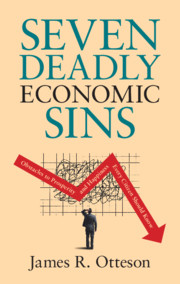Book contents
- Seven Deadly Economic Sins
- Seven Deadly Economic Sins
- Copyright page
- Dedication
- Contents
- Preface
- Introduction
- 1 Wealth Is Positive-Sum
- 2 Good Is Not Good Enough
- 3 There Is No Great Mind
- 4 Progress Is Not Inevitable
- 5 Economics and/or Morality
- 6 Equality of What?
- 7 Markets Are Not Perfect
- Conclusion
- Postscript
- References and Further Reading
- Acknowledgments
- Index
6 - Equality of What?
Published online by Cambridge University Press: 09 April 2021
- Seven Deadly Economic Sins
- Seven Deadly Economic Sins
- Copyright page
- Dedication
- Contents
- Preface
- Introduction
- 1 Wealth Is Positive-Sum
- 2 Good Is Not Good Enough
- 3 There Is No Great Mind
- 4 Progress Is Not Inevitable
- 5 Economics and/or Morality
- 6 Equality of What?
- 7 Markets Are Not Perfect
- Conclusion
- Postscript
- References and Further Reading
- Acknowledgments
- Index
Summary
Equality is one of our abiding moral concerns. In a 2013 speech, President Barack Obama claimed that inequality was indeed “the defining challenge of our time.” There are, however, different conceptions of equality, which raises the question, as Nobel laureate Amartya Sen (1995) has asked, “Equality of what?” Sen argues that various definitions of equality entail satisfying one conception of equality only at the expense of others. You cannot have equality of resources, for example, without sacrificing equality of individual liberty. You cannot have equality of material conditions without sacrificing equality of resources. And so on. Hence, there is no such thing as advocacy for equality full stop: we have to specify which kind of equality we want, and then we have to explain why that specific kind of equality should be advanced above the others.
- Type
- Chapter
- Information
- Seven Deadly Economic SinsObstacles to Prosperity and Happiness Every Citizen Should Know, pp. 187 - 207Publisher: Cambridge University PressPrint publication year: 2021

